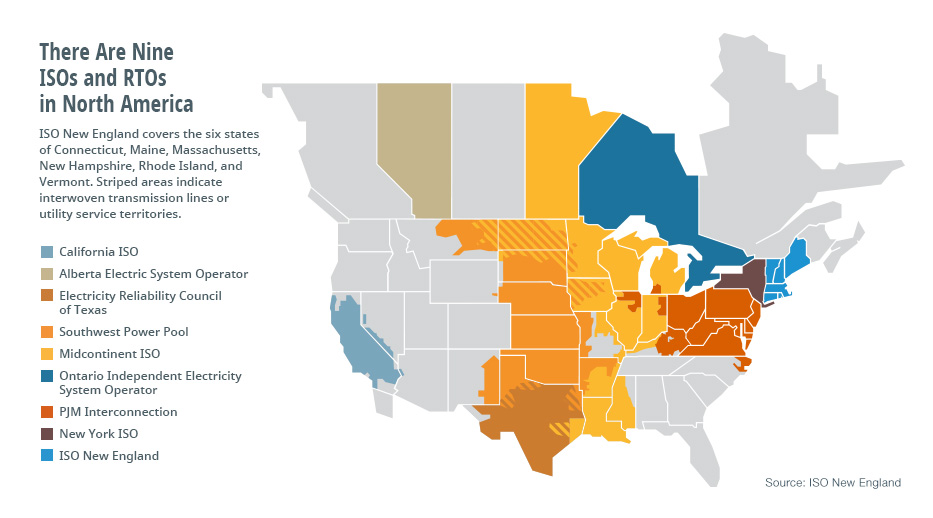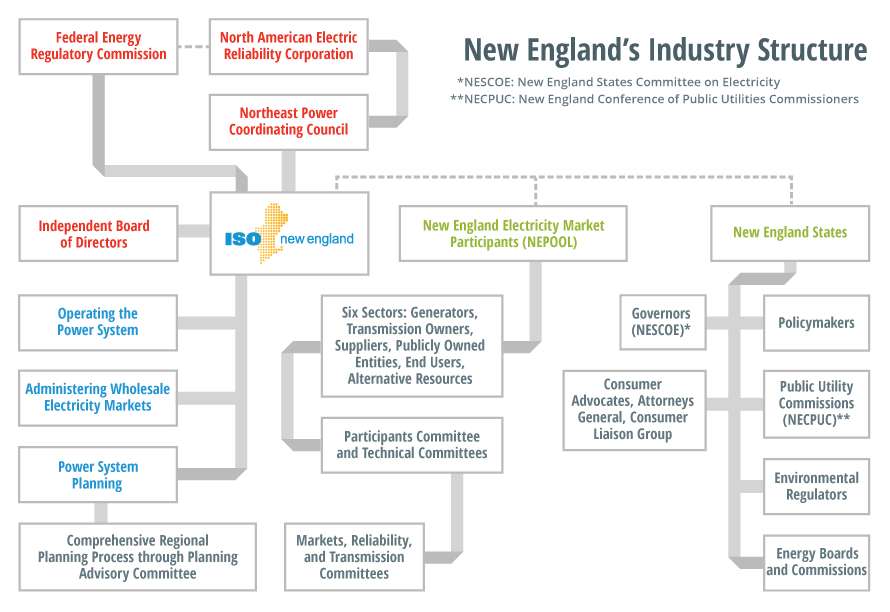ISO New England is regulated by the Federal Energy Regulatory Commission (FERC), which defines our authority, responsibilities, and the services we provide in New England. FERC’s mandated or approved rules are detailed in the ISO New England Inc. Transmission, Markets, and Services Tariff (the ISO Tariff). The ISO Tariff also outlines the FERC-approved revenues the ISO collects for its services and sets out the cost recovery and allocation mechanisms for transmission and ancillary services in the region. In conjunction with the ISO’s Transmission Operating Agreements, the ISO Tariff helps satisfy FERC requirements for the ISO’s functioning as a Regional Transmission Organization (RTO).
The ISO is one of nine RTOs and Independent System Operators (ISOs) in North America. FERC created us as an ISO in 1997. While “ISO” remains part of our name, FERC designated us an RTO in 2005. ISOs and RTOs share many core principles and functions in operating regional grids, running wholesale markets, and power system planning. One of the main differences in operating as an RTO is that ISO New England has broader authority over the operation of the transmission system. See FERC Order No. 2000 for details.
The ISO New England Inc. Transmission, Markets, and Services Tariff (the ISO Tariff) provides the rates, terms, and conditions for transmission, market, and other services provided by the ISO.

New England’s power grid is part of a larger electric power system.
While having a large, interconnected network helps achieve highly reliable electric service, this tight interconnectedness means that careful regulations, planning, and monitoring are needed to maintain reliability and prevent problems that occur in one area from cascading to another area of the system. In addition to adhering to FERC requirements, the ISO abides by strict rules, standards, and requirements established for maintaining power system reliability set by other organizations. View our rules and procedures.
Our independence from entities doing business in New England’s electricity industry is what allows us to create a level playing field for market participants and to make objective decisions for the good of the region as a whole when it comes to system operations, regional system planning, and wholesale market administration. However, ISO New England does work collaboratively with numerous stakeholders representing a wide variety of constituencies, technologies, and interests to put together comprehensive rules, policies, and solutions that yield the best possible results for the region.

Visit our Board of Directors page to learn about the independent group of leaders that helps guide the ISO in fulfilling its mission.
Explore our Committees and Groups section to learn more about the various stakeholder committees, working groups, and forums that collaborate with the ISO. For example:
In its collaboration with the states, of note are two organizations that advise the ISO on regional electricity matters:
The collaborative process, rights, and responsibilities established between the ISO and its stakeholders are outlined in the following documents:
NEPOOL is ISO New England’s predecessor organization. It was formed in 1971 to establish the central dispatch of generation in New England; handle settlements and billing; coordinate outages of transmission and generation equipment; undertake joint planning; and undertake other measures to improve system reliability and economics. Initially and through the early 1990s, NEPOOL was the voluntary organization of New England’s investor-owned and publicly-owned electric utilities. In 1997, NEPOOL employees became the employees of ISO New England, and NEPOOL continued on as the association of New England’s market participants.